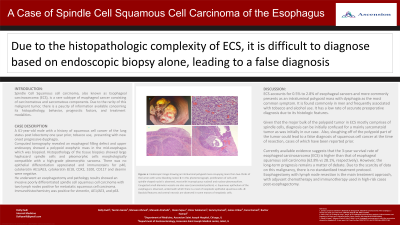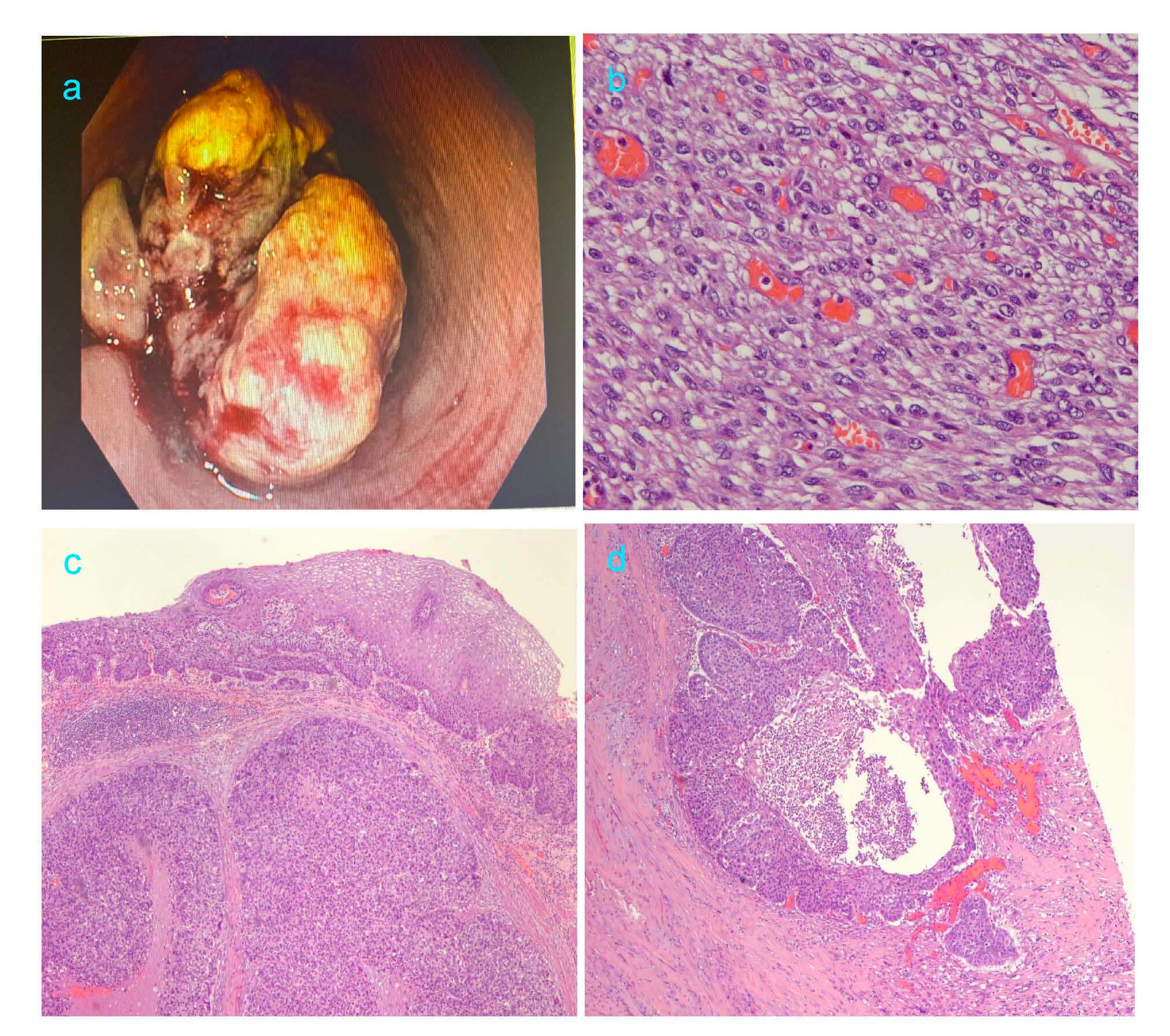Monday Poster Session
Category: Esophagus
P2289 - A Case of Spindle Cell Squamous Cell Carcinoma of the Esophagus
Monday, October 28, 2024
10:30 AM - 4:00 PM ET
Location: Exhibit Hall E

Has Audio

Dolly Ewili, MD
Ascension Saint Joseph Hospital
Chicago, IL
Presenting Author(s)
Dolly Ewili, MD1, Yasmin Gerais, MD2, Marwan Ahmed, MD1, Marwah Alchalabi, MD1, Hasan Sqour, MD1, Omar Alsalman, MD2, Sammy Hamad, DO2, James Urban, MD3, Fares Hamad, DO2, Teresita Zdunek, MD4, Bachar Hamad, MD3
1Ascension Saint Joseph Hospital, Chicago, IL; 2Ascension Saint Joseph Medical Center, Joliet, IL; 3Ascension Saint Joseph Hospital, Joliet, IL; 4Ascension St. John Hospital, Chicago, IL
Introduction: Spindle Cell Squamous cell carcinoma, also known as Esophageal carcinosarcoma (ECS), is a rare subtype of esophageal cancer consisting of carcinomatous and sarcomatous components. Due to the rarity of this malignant tumor, there is a paucity of information available concerning its histopathology, behavior, prognostic factors, and treatment modalities.
Case Description/Methods: Here we describe a case of a 61-year-old male with a history of squamous cell cancer of the lung status post lobectomy one year prior presenting with new onset dysphagia. Computed tomography revealed an esophageal filling defect and upper endoscopy showed a polypoid exophytic mass in the mid-esophagus. Biopsy of the mass showed histologic features suggesting a high-grade pleomorphic sarcoma with no epithelial differentiation appreciated. He underwent an esophagectomy and pathology showed a poorly differentiated spindle cell squamous cell carcinoma with immunohistochemistry positive for both mesenchymal and epithelial cell proteins including vimentin, AE1/AE3, and p63. Two lymph nodes were positive for metastatic squamous cell carcinoma (T1bN1M0). He was scheduled to start adjuvant nivolumab.
Discussion: ECS accounts for 0.5% to 2.8% of esophageal cancers and more commonly presents as an intraluminal polypoid mass with dysphagia as the most common symptom. Due to the histopathologic complexity of ECS, it is difficult to diagnose based on endoscopic biopsy alone as incomplete tissue sampling may occur, leading to a false diagnosis. In our case, the tumor was wrongly classified as a pure pleomorphic sarcoma based on the upper endoscopic biopsies.
Currently available evidence suggests that the 3-year survival rate of esophageal carcinosarcoma (ECS) is higher than that of esophageal squamous cell carcinoma (62.8% vs 28.1%, respectively). However, the long-term prognosis remains a matter of debate. Due to the scarcity of data on this malignancy, there is no standardized treatment protocol. Esophagectomy with lymph node resection is the main treatment approach, with adjuvant chemotherapy and immunotherapy used in high-risk cases post-esophagectomy.

Disclosures:
Dolly Ewili, MD1, Yasmin Gerais, MD2, Marwan Ahmed, MD1, Marwah Alchalabi, MD1, Hasan Sqour, MD1, Omar Alsalman, MD2, Sammy Hamad, DO2, James Urban, MD3, Fares Hamad, DO2, Teresita Zdunek, MD4, Bachar Hamad, MD3. P2289 - A Case of Spindle Cell Squamous Cell Carcinoma of the Esophagus, ACG 2024 Annual Scientific Meeting Abstracts. Philadelphia, PA: American College of Gastroenterology.
1Ascension Saint Joseph Hospital, Chicago, IL; 2Ascension Saint Joseph Medical Center, Joliet, IL; 3Ascension Saint Joseph Hospital, Joliet, IL; 4Ascension St. John Hospital, Chicago, IL
Introduction: Spindle Cell Squamous cell carcinoma, also known as Esophageal carcinosarcoma (ECS), is a rare subtype of esophageal cancer consisting of carcinomatous and sarcomatous components. Due to the rarity of this malignant tumor, there is a paucity of information available concerning its histopathology, behavior, prognostic factors, and treatment modalities.
Case Description/Methods: Here we describe a case of a 61-year-old male with a history of squamous cell cancer of the lung status post lobectomy one year prior presenting with new onset dysphagia. Computed tomography revealed an esophageal filling defect and upper endoscopy showed a polypoid exophytic mass in the mid-esophagus. Biopsy of the mass showed histologic features suggesting a high-grade pleomorphic sarcoma with no epithelial differentiation appreciated. He underwent an esophagectomy and pathology showed a poorly differentiated spindle cell squamous cell carcinoma with immunohistochemistry positive for both mesenchymal and epithelial cell proteins including vimentin, AE1/AE3, and p63. Two lymph nodes were positive for metastatic squamous cell carcinoma (T1bN1M0). He was scheduled to start adjuvant nivolumab.
Discussion: ECS accounts for 0.5% to 2.8% of esophageal cancers and more commonly presents as an intraluminal polypoid mass with dysphagia as the most common symptom. Due to the histopathologic complexity of ECS, it is difficult to diagnose based on endoscopic biopsy alone as incomplete tissue sampling may occur, leading to a false diagnosis. In our case, the tumor was wrongly classified as a pure pleomorphic sarcoma based on the upper endoscopic biopsies.
Currently available evidence suggests that the 3-year survival rate of esophageal carcinosarcoma (ECS) is higher than that of esophageal squamous cell carcinoma (62.8% vs 28.1%, respectively). However, the long-term prognosis remains a matter of debate. Due to the scarcity of data on this malignancy, there is no standardized treatment protocol. Esophagectomy with lymph node resection is the main treatment approach, with adjuvant chemotherapy and immunotherapy used in high-risk cases post-esophagectomy.

Figure: Figure a: Endoscopic image showing an intraluminal polyploid mass occupying more than two-thirds of the lumen with some bleeding noted. b: In this photomicrograph, proliferation of cells with spindle-shaped nuclei is observed, most with inconspicuous nucleoli and nuclear pleomorphism. Congested small-diameter vessels are also seen (sarcomatoid pattern). c: Squamous epithelium of the esophagus is observed, underneath which there is a nest of neoplastic epithelial squamous cells. d: Basaloid features and central necrosis are observed in some masses of neoplastic cells.
Disclosures:
Dolly Ewili indicated no relevant financial relationships.
Yasmin Gerais indicated no relevant financial relationships.
Marwan Ahmed indicated no relevant financial relationships.
Marwah Alchalabi indicated no relevant financial relationships.
Hasan Sqour indicated no relevant financial relationships.
Omar Alsalman indicated no relevant financial relationships.
Sammy Hamad indicated no relevant financial relationships.
James Urban indicated no relevant financial relationships.
Fares Hamad indicated no relevant financial relationships.
Teresita Zdunek indicated no relevant financial relationships.
Bachar Hamad indicated no relevant financial relationships.
Dolly Ewili, MD1, Yasmin Gerais, MD2, Marwan Ahmed, MD1, Marwah Alchalabi, MD1, Hasan Sqour, MD1, Omar Alsalman, MD2, Sammy Hamad, DO2, James Urban, MD3, Fares Hamad, DO2, Teresita Zdunek, MD4, Bachar Hamad, MD3. P2289 - A Case of Spindle Cell Squamous Cell Carcinoma of the Esophagus, ACG 2024 Annual Scientific Meeting Abstracts. Philadelphia, PA: American College of Gastroenterology.
